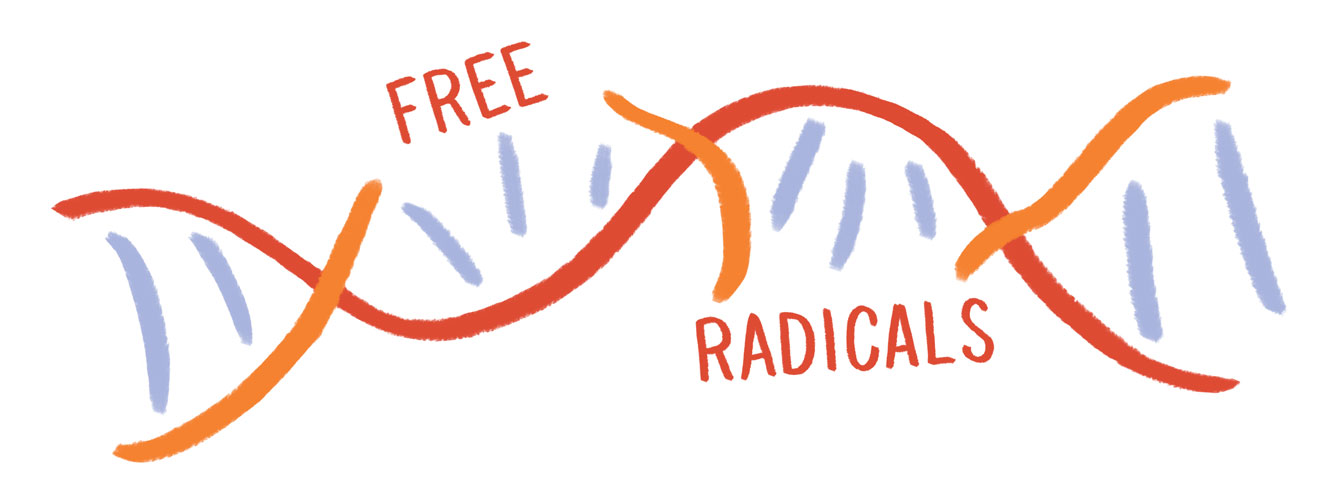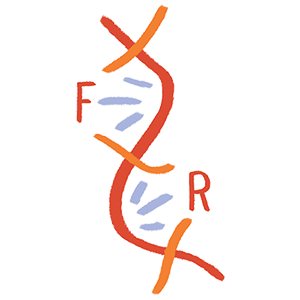
A line of people (and one cat) hold hands on a grassy field between a forest and a stream. In the foreground, hands striving to create a more socially just, equitable, and accountable science pull apart the chains of a fence linked together by harmful systems. Illustration by Sophie Wang @wangshuf
Free Radicals is a space for exploring the relationship of science and social justice, and we end up spending a lot of time discussing our critiques of science and challenging the power we often give to it in our society. But at the same time that we struggle with the ways in which we would like science to be better, many of us still derive joy and wonder from all that science has to offer. Below we describe some of the reasons we love science.

Art: I’ll start by explaining why I loved Legos so much growing up. Even though my name is Art, I’ve never felt very connected to more traditional forms of artistic expression like music, drawing, or writing (much to the chagrin of my parents, I’m sure.) Instead, my childhood creativity often found itself routed through Legos. I loved the almost puzzle-like aspect of playing with the blocks – having to figure out which pieces would be best suited in what combination to make a cool-looking spaceship wing was intellectually stimulating, and the click of interlocking pieces was physically satisfying. There was also an aspect of creativity bred by restriction when playing with Legos. Pieces had to fit together in specific ways, but masterful manipulation of these fixed forms could lead to something truly sublime. I think my love of science is rooted in very similar places. A lot of scientific questions are puzzles to be solved, with the pieces being the various known experimentation methods and tools available to scientists. Working within the limits of human capabilities and the knowledge currently available poses a challenge to our creativity that I think is fundamental to building science and Legos. While science can be very tiring, dreary work, I love and cherish those moments when it becomes more like play.

Kelly: Science was something I never loved organically, but was rather something I felt I had a responsibility TO love. As a young child, I preferred (and was more gifted at) the creative arts; at any given moment, I was more likely to be holed up with a book, writing a self-insert fantasy adventure, or knitting clumsily under my grandmother’s supervision. As I got older and grew into elementary feminism, I felt it was incumbent on me to represent women in a field where we were historically underrepresented, maligned, and excluded from. Gradually, it became easy to convince myself I “loved” science — even easier once I started getting good grades in chemistry and biology. In college, I majored in chemistry and was lucky to join a research lab that gave me a lot of control over the design of experiments, which was satisfying in its own way. But all of that is to say: I certainly have a lot of emotions about the social, historical, and political contexts of science. But do I feel anything special about science on its own (if science even exists outside of those contexts)? No.

Taylin: Science brings to mind a mess of things: high school biology and chemistry classes, college orgo labs, pipettes and finely-tuned scales, physics problems and equations with more constants than possible for real life. However, if you think about anything for long enough, you can find the “science” in everything: from the matter it’s composed of to how it obeys the laws of nature to what makes it work. In that sense, I don’t know how anybody could not constantly interact with and appreciate science, whether or not they are aware of labelling it as such. Something as everyday as cooking a good meal or watching a funny video on the internet requires so many different aspects of science! Even thinking about things I loved doing growing up, such as playing piano or skiing down mountains invoked a sense of inquiry and repetition, fundamentals that make up the heart of science. The curiosity that came out of the mundane, asking questions like, “How many times do I have to practice this before I memorize the piece?” or “Why does meat taste so good?” or “What is the weather going to be like today?” is the type of learning that I derive great joy in finding answers to. This goes on to shape how I find patterns and truths about myself, my surroundings, and other people that help me make sense of the world.
 Alexis: I love science for creating these moments of awareness where your frame of reference is shifted to reveal that we are bigger / smaller / more interconnected than our minds can even comprehend. It can be easy to get caught up in the daily grind of life at the human scale, so I like to be jolted out of my bubble and confront all these forces and systems and processes that are always happening unacknowledged around me. I remember my high school biology teacher asking us ‘Why do we need oxygen?’ and suddenly realizing that I had gone the last fourteen years of my life without even knowing why I breathe. Or discovering that all my thoughts and feelings, which feel intensely personal, are ultimately based on the simple flow of ions across millions of neural membranes. I love that science forces us to decenter ourselves, especially as we grapple with the myriad impacts of human civilization on our environment, health, and the biodiversity of this planet.
Alexis: I love science for creating these moments of awareness where your frame of reference is shifted to reveal that we are bigger / smaller / more interconnected than our minds can even comprehend. It can be easy to get caught up in the daily grind of life at the human scale, so I like to be jolted out of my bubble and confront all these forces and systems and processes that are always happening unacknowledged around me. I remember my high school biology teacher asking us ‘Why do we need oxygen?’ and suddenly realizing that I had gone the last fourteen years of my life without even knowing why I breathe. Or discovering that all my thoughts and feelings, which feel intensely personal, are ultimately based on the simple flow of ions across millions of neural membranes. I love that science forces us to decenter ourselves, especially as we grapple with the myriad impacts of human civilization on our environment, health, and the biodiversity of this planet.
 Sophie: I love questions. I love hearing about creative ways that people answer questions. I love the process of learning what other people have done to answer other questions and connecting these sometimes-disparate pieces of knowledge together to weave an answer to my own questions. I love the excitement of teasing out a little bit more knowledge about our world today or our world before or our world some day. I love being surprised by the strange beauty and incredible complexity and unexpected twists and interdependent relationships that evolution has unwittingly gifted the living world with. And ultimately, I think what I love the most about science is constantly being surprised by the infinite nature of what people’s minds are capable of asking, seeing, molding, and connecting, and how our different perspectives and different experiences create a multitude of possible questions and ways to answer these questions.
Sophie: I love questions. I love hearing about creative ways that people answer questions. I love the process of learning what other people have done to answer other questions and connecting these sometimes-disparate pieces of knowledge together to weave an answer to my own questions. I love the excitement of teasing out a little bit more knowledge about our world today or our world before or our world some day. I love being surprised by the strange beauty and incredible complexity and unexpected twists and interdependent relationships that evolution has unwittingly gifted the living world with. And ultimately, I think what I love the most about science is constantly being surprised by the infinite nature of what people’s minds are capable of asking, seeing, molding, and connecting, and how our different perspectives and different experiences create a multitude of possible questions and ways to answer these questions.
 Linus: What I love about science is the cycle (struggle?) of asking questions and searching for answers. As we find and share new bits of information, we use them to update (and sometimes shatter) our understanding of the world. These new understandings inevitably raise new questions and areas to explore. This process excites me and has (for better or for worse) leaked into most parts of my life. I think that from the questions that I ask and am interested in answering, I’ve gotten a better idea of what things really matter to me. My hope is that as we continue to do science, our questions, methods, and answers become reflections of ourselves and our communities.
Linus: What I love about science is the cycle (struggle?) of asking questions and searching for answers. As we find and share new bits of information, we use them to update (and sometimes shatter) our understanding of the world. These new understandings inevitably raise new questions and areas to explore. This process excites me and has (for better or for worse) leaked into most parts of my life. I think that from the questions that I ask and am interested in answering, I’ve gotten a better idea of what things really matter to me. My hope is that as we continue to do science, our questions, methods, and answers become reflections of ourselves and our communities.
 Andy: For me, science can be a source of profound spirituality. I love science for the sense of wonder and humility it provides me. As astrophysicist and famed popular educator Carl Sagan wrote, “when we recognize our place in an immensity of light-years and in the passage of ages, when we grasp the intricacy, beauty, and subtlety of life, then that soaring feeling, that sense of elation and humility combined, is surely spiritual.” I see beauty in knowing how the sun’s light bounces and refracts across the sky to reach my eyes. I find grace in understanding how the trees breathe carbon dioxide to provide oxygen for our survival. And I feel humble with the recognition that our planet is one of many in the universe. I believe science, by positioning our existence within a greater system beyond ourselves, serves to deepen our humanity and compassion for each other. Because science tells us that our collective consciousness is rare, I am inspired to love deeper and connect with others.
Andy: For me, science can be a source of profound spirituality. I love science for the sense of wonder and humility it provides me. As astrophysicist and famed popular educator Carl Sagan wrote, “when we recognize our place in an immensity of light-years and in the passage of ages, when we grasp the intricacy, beauty, and subtlety of life, then that soaring feeling, that sense of elation and humility combined, is surely spiritual.” I see beauty in knowing how the sun’s light bounces and refracts across the sky to reach my eyes. I find grace in understanding how the trees breathe carbon dioxide to provide oxygen for our survival. And I feel humble with the recognition that our planet is one of many in the universe. I believe science, by positioning our existence within a greater system beyond ourselves, serves to deepen our humanity and compassion for each other. Because science tells us that our collective consciousness is rare, I am inspired to love deeper and connect with others.





